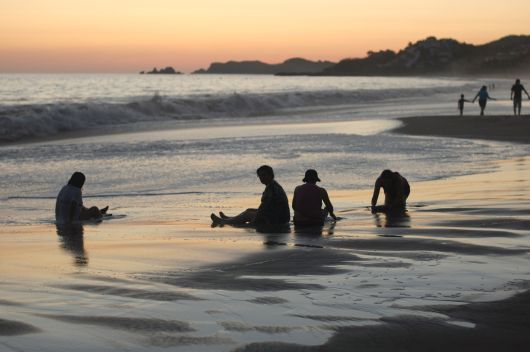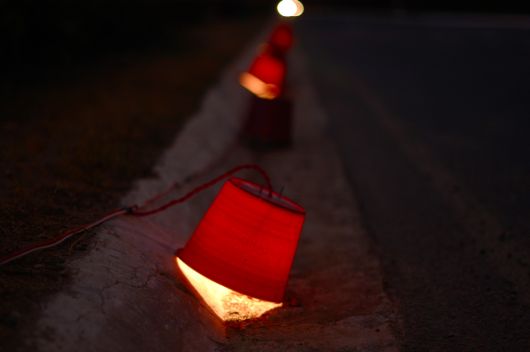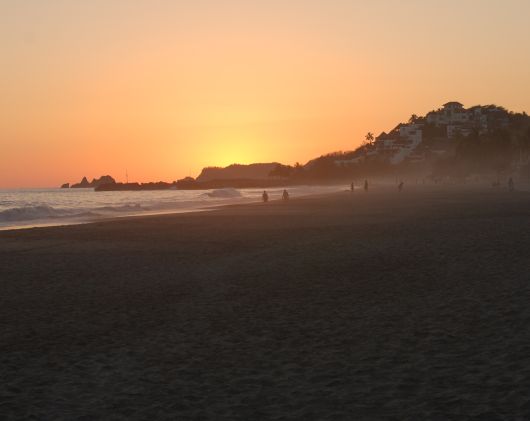
The Well
by LEAH BUCKLEY
A storyteller relies on deception, depends on the secrets of his characters and coddles their depth, their small lies and their great fears. It is easy to forget that they share your own blood.
The immigration line in the Mexico City airport was already a tangle of confused Japanese tourists, and adding the passengers from our JFK flight turned chaos to panic. Rodrigo pulled me into a much shorter line tucked off to the side. “But this is for citizens...” I turned and looked longingly at the angry New Yorkers commanding order from the Japanese tour guide. “I don’t even speak Spanish.” An official looking man with white rubber gloves raised his eyebrows at me. He had a look, like, "caught you, you mother fucker. You don’t belong here.”
“Hola,” I smile. I wanted desperately to go back in the other line.
+
The whole family picked us up from the airport, a welcome wagon waiting with cab drivers and lovers holding flowers. We piled into his uncle’s little four door like it was a clown car, knocking knees on the speed bumps out of the garage. Traveling gives the visitor a beguiling sense of wonder—even airport parking lots have an exotic smell, like the water you can brush your teeth with but can’t drink. They passed around hand sanitizer disguised as a Despicable Me minion toy. “Take some of the minion,” Rodrigo urged. I shook my head — my hands were cautiously tucked under my legs. “No seriously. It’s dirty here.”
+
That night I took a walk alone in the just dusk and looked for shadow shapes to remember.
There was a woman in front of me in a tight dress, her gait labored as she navigated cracked pavement in high heel sandals.
The night was empty of sound and her sensuality felt unnatural as we passed looming construction vehicles abandoned for the night.
I sped up to pass her.
Just as I leveled with her she gasped, falling off her strappy platform
We were so close that I had to say something. "I won't tell," I smiled.
Relived she laughed back, out of breath. "Me novio…supposed to pick me up, cabron," she whined.
I wondered if she felt very alone. There was heartache behind her effort, and I feared my resemblance to her.

+
I wandered back from the supermarket, backlit now.
Dark corners lurched out at me and played at the uneasiness in my stomach.
Fingers found comfort in concentric circles around the crispy pastry in my bag, and the crunch in my head drowned out any possibility of danger.
+
The next morning Rodrigo’s abuelo arrived.
His slow steps down the skinny spiral staircase quieted the room.
He wasn’t particularly tall, but he bore the authority of a much larger man. He had the belly characteristic of an epicurean, someone who swam in the ocean despite — or because of — the height of the waves, and ate all the ceviche he wanted. Dignified black hair slicked across his head and shone with lacquered glittering profusion. I noticed thick muscular hands of a younger life, tan from summers in the hot dessert.
+
In private, Abuelo commanded the same awe as he did in Mexico City's presidential palace.
But now, the living room was peppered with uncertainty.
Since the stroke his speech had gotten better, but the great labor in his voice was a quiet secret the family shared.
With each opening line he took an enormous risk.
+
There is a room in the house where Rodrigo's uncle works. Scattered across the big desk are books and magazines, Spanish, English.
Only standing behind the desk did I notice his uncle had taped photos of thinkers and artists. I had trouble recognizing them — one was Locke, maybe.
Was it lonely to look up and only see strangers?
That morning his uncle was working in the garden on the roof. His two little boys played noiselessly about the deck, occasionally hopping off their tricycles to examine the roots of some exotic plant their father was working on, one tucking a head under his father’s shoulder, the other throwing two arms around his neck in an impetuous embrace. He took the opportunity to smooth out hair and brush dirt off faces with the tender quieting hands of a gardener.
+
The boys told me they had a joke for me, a Spanish language learner.
Había un zorro caminando por el desierto. Estaba solo hasta que se encontró con un burro. El zorro chocó con el burro y dijo
"I'm sorry"
y el burro contestó
"I'm burry"
I didn’t get it. That night, alone, I googled “Spanish English Burro joke translation.”
+
Not too far from where we were staying in Mexico City, Diego Rivera and Frida Kahlo's house sits on an unassuming plot.
There are two buildings surrounded by a cactus fence, one blue for Diego, and Frida's red. They are connected by the slimmest of bridges.
I wondered if Frida ever lay awake alone in her house thinking about what her art would look like if she had had children. But only because I imagined her as me.
I stopped thinking about it, and just felt like a cliché.

Abuelo stood wringing his hands in the living room until doorbell sounded sharply. He took stock of the dimly lit room, his suitcase in the corner. “What was the name of the town where the beach house was?” he asked, smiling. A facetious question — he has owned that beach house for 30 odd years.
+
Was it his fortitude of character that made him so majestic? I felt that he was very different from all the strong men I have known, as the land is different from the sea.
+
The next day Rodrigo and I escaped to that beach house and for a few days it's just the two of us.
Rodrigo shakes his head at me. "If we are here, I think we are here for a reason."
I wondered how forgiveness works as I kneaded my toes into the sand.
Time began to feel like a trap.
But how could we be afraid when the sky met the water and all around us waves pulled and pushed?
+
Rodrigo plucked an eyelash from my cheek. My face felt changed under his hands, slightly sad at the edges. I thought of what I looked like in that moment, to him.
Years distanced me from the image in the black mirror pupils.
“Up or down?”
“Down.”
He opened his fingers and there was nothing there, only sandy skin. I had forgotten to make a wish anyway.
+
Mornings on the beach were mine until about 10:30.
The sand was hot enough that if you wanted to swim you had to sprint to the ocean break.
A man with a factitious tan, maybe 60, tip-toe ran down the beach, boogie board under his arm.
Hair slicked back with salt water, I watched him get tousled by the waves, guffaw like a child.
I imagined him tumbling under a big crest, the water piling and piling on top of him as he fought for a breath.
But he doesn’t drown, as big as the waves are.
Beaten and exhausted, he trudges up the beach around 11.
He has a hitch in his step like a broken toy.
The woman, equally tan (so the bronze skin was for her liking then?) was splayed out on a lawn chair.
Silently they gathered their towels and shifted to the pool deck.
+
I know those people. Unnatural tans, discomfort in the waves. Ignoble people like us are swept along by ocean streams kicking and gasping, or nervously hover about the edge of its great force.
+
We were sitting outside for lunch.
The tan couple already put in an order of quesadillas at their usual spot next to us.
“Where you folks from?” I placed the accent in an instant.
"We are coming from New York," I replied, not sure if I should get into it.
"...But I'm originally from Minnesota."
"Ah, we are from across the lake! Wisconsin, Hayward actually." Her eyes lit up, while the rest of her face remained impossibly tan and fixed in place.
"Wow New York. Real busy there," the boogie-boarder chimed in. I knew it was coming. "I could never live there, I’m afraid of that many people."
"Yep, it gets pretty busy..." I waited for one of them to ask me when I was moving home, or how my mother feels, me being so far away and all.
"We've been to Times Square. I don't know how you do it. All those people."
I felt strangely comforted by their predictability, and immediately guilty for not fearing it.
+
But the image of that tan man staggering up the beach haunts me. He bears no resemblance to the strength in Abuelo’s calm hands.
I want that control.
"I’m ready. I don't care if you believe me," I say to Rodrigo, but I care more than anything right now.
I ache for him.
I’m throwing my fears into the sea and jumping with them.
When I do fall, I want to fall slowly.
He moves with the water, rising and falling, his tall form dwarfed by the sweeping swells. When I try to follow him I meet the ocean floor and gritty sand between my teeth. He was born in the waves, and will die there — fearless in the infinite blue. I dream of that ocean.
+
The next day there is a lightness in my feet. I can feel the strength of my arms, and warm blood pumping in my brain. A mercurial feeling of weightlessness rises in my chest. Wave after wave it frees me.
Leah Buckley is a contributor to This Recording. She is a writer living in New York. Photographs by the author.
